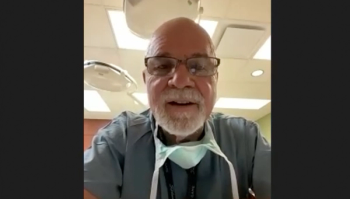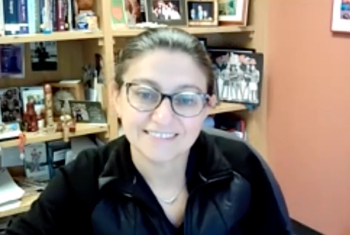
How building a social media presence can positively impact your professional development
Casey Seideman, MD, advocates for an online presence in a recent presentation given at the 2022 Society of Women in Urology Annual Clinical Mentoring Conference, titled “Social media as an avenue for justice.”
Social media has many negative reputations, creating a reluctance amongst users to participate in the online conversation or to join the online community at all.
Casey Seideman, MD, advocates for an online presence in a recent presentation given at the 2022 Society of Women in Urology Annual Clinical Mentoring Conference, titled “Social media as an avenue for justice.”1 For physicians especially, she argues, social media can be a tool to connect with mentors and peers, as well as promote your accomplishments. In this interview, she discusses the main points of her presentation and tips to help those who are reluctant to join the online world. Seideman is a pediatric urologist at Doernbecher Children’s Hospital at Oregon Health & Science University in Portland.
Please summarize the main points of your presentation.
I was talking about the ability to utilize social media and harness it for advocacy and justice. And so, when we think of social media, I think the first thing that everyone thinks of is connecting to friends and family members. But some platforms such as Twitter actually have a really large medical presence, so you have a lot of professionals on Twitter and there's actually a really large social advocacy presence on Twitter already. The main point of my presentation was really how to utilize Twitter as a platform for areas that you might be interested in in terms of advocacy or justice. For myself, I'm very interested in gender equity. I really try to utilize the Twitter platform for purposes of gender equity, and diversity, equity, and inclusion, and it's been a really wonderful medium for that work.
What is the take-home message for the practicing urologist?
The number one point that I love to make when we talk about social media and advocacy work is that you have to stay true to yourself. You have to figure out what your core values are because I think it's really easy to get lost in the flow of social media. And then you have to take those core values and apply them to what you're passionate about. So, if you're passionate about equity work and diversity, equity, and inclusion, I think that you take your core values, and you marry that with your advocacy. If you do that, I think you'll find it to be very fulfilling. You'll find a lot of people across the platform, perhaps from different specialties, who are engaged in similar areas, you'll find that people are doing this work at different institutions that you might not have met before or not had the opportunity to talk to, and I think that you'll also find a lot of inspiration and passion from an environment that allows you to put yourself out there in a way that you might not be able to at your home institution, or on a local level.
What advice would you give to fellow physicians on becoming more involved on social media, including those who are reluctant to go on social media to begin with?
I think it's really natural, especially in the beginning, to be reluctant to utilize social media to its full potential. So, I usually tell people that your first step should be [in] a stepwise process, where you get involved a little bit, get to know some of the people that you might already interact with on an academic level and follow them. And then you can start to respond or react to other people's posts. Let's say that you're really interested in telehealth, for example. That's a really important aspect of our health care system right now, given the pandemic. You might start following other people who are passionate about telehealth, and eventually you can start to respond to those people and give them your own individual thoughts and opinions. I think that's a really great way of starting to engage, and then eventually, I think you'll reach a certain level of comfort, where you'll start to put your own material out there. I also want to encourage people to utilize it for self-promotion. Let's say you write a paper, and you're really proud of it. There's actually really great data that shows that papers are now distributed via social media. People love to retweet and share things, so if you wrote something, or you're giving a talk or a seminar, that's a wonderful opportunity to promote yourself utilizing the Twitter or social media platforms.
What are some tips and tricks to avoid the negative aspects of social media?
That is a really, really important point. Like any form of social media, I think that there are going to be people who are going to be reactive, and there are going to be people who are negative, and there will also be people who disagree with you, and that's okay. So first, I think [you should] circle back to the idea of staying true to your core values. If you stay true to your core values and what you truly believe in, I think you'll have a lot easier time dealing with any sort of negative feedback or responses. If you put something out there and you say, "I am so excited about this diversity event," and someone responds to you in a negative manner, you can just mute them. You don't need that, and it doesn't really matter. Or if you're truly unbothered by it, just let it sit there and it doesn't matter either. But I also recommend not to engage with people who are anonymous who might be trying to get a rise out of you because I think that that's a lot of wasted energy. If you're there to spread a positive movement or advocacy work, it's not really necessarily worth your emotional time and effort. But those people are out there, so preserve yourself first and foremost and stay true to your core values.
Is there anything else you feel our audience should know about this topic?
I think that the utilization of social media for professionals is only going to grow. And I would really encourage people at every level to start to dip their toe in the water and explore Twitter or other social media platforms. I found it to be incredibly powerful when I watch students who are interested in urology connect with mentors across the country. I think it's incredibly powerful when I see people promoting their academic work and getting opportunities on a national level that they might not have gotten before. And so, take a little bit of a risk and be professional, be polite, but go for it.
Reference
1. Seideman C. Social media as an avenue for justice. Presented at: 2022 Society of Women in Urology Annual Clinical Mentoring Conference; February 7-9, 2022; New Orleans, Louisiana.
Newsletter
Stay current with the latest urology news and practice-changing insights — sign up now for the essential updates every urologist needs.






